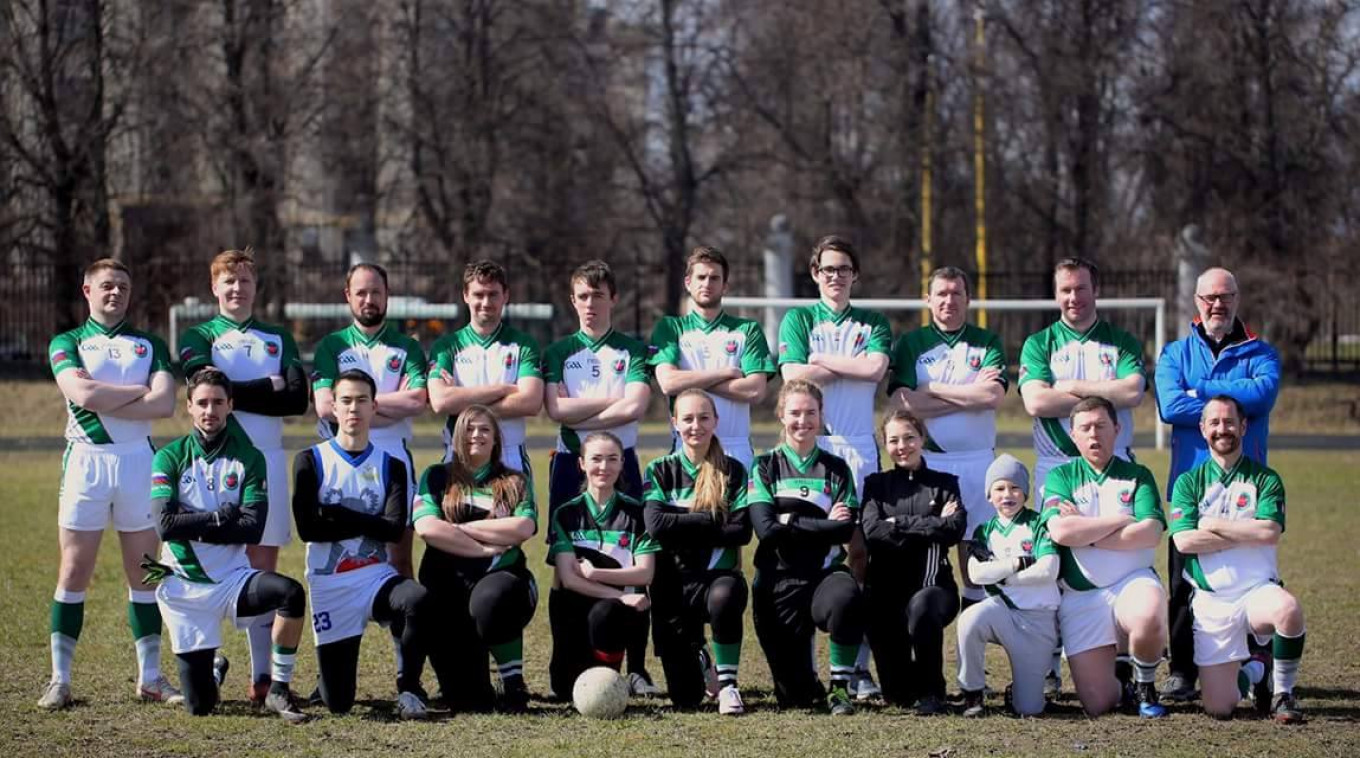For the last four years, the Moscow Shamrocks has brought a flavor of Ireland's national sport to the people of the Russian capital.
Not to be confused with "English football" or “soccer,” Gaelic football uses 15 players per team in matches lasting 70 minutes. Players can bounce, kick or pass the ball to move it down the field, but can only travel for four steps while carrying the ball.
The Moscow Times spoke to IT teacher and club chairperson Kieran Haren on building the team, surviving Moscow as a parent, and why Russians may not be as close to the Irish as they like to believe.
We are Russia's only Gaelic football team.
Or at least, we're the only official team in Russian that I know of. It's a privilege, but it means that we don’t have another team to play against either. We play against Moscow's Australian rules football team because the rules are similar.
At first, I didn't know how I'd survive in Moscow.
I never thought that I'd end up living in Russia, but it was a struggle to find work in Ireland. Lots of my friends were already moving abroad to places like the UK. But my wife and I thought that if we were going to move abroad, we should really go for it. Some things were tough. I still remember trying to buy a loaf of bread at the kiosk close to my building a few weeks after I arrived. Standing in line, I realized that I didn't even know the word for bread in Russian. But slowly, the people who ran the kiosk got used to me, I came back every time having learned more and more.
Gaelic football is ingrained in the Irish people.
Everyone in Ireland supports their local team and their local county, through the good and the bad. Because it’s an amateur sport, there’s no drive to make money from it. You do it for the love of it. Most of the players here are like me: they haven't played since they were in school. But they want that community spirit and sense of family. We all support the club as volunteers; there's no funding or financial reward. When we need equipment, different team members head home to Ireland and stuff whatever they can into their suitcases. At the moment, we're holding fortnightly quizzes at Katie O'Shea's Irish pub to boost funds.

Russians see the Irish as kindred spirits.
Russian people are interested in everything Irish. They might think that Gaelic football is a little bit weird, but they get into it. I think they really see us as kindred spirits. Both nations have been through hardship. There's the Guinness as well, that’s always a winner.
Russian people say that they're like the Irish, but I don't know if that's true. Russian people tend to be suspicious of newcomers, but then they're very friendly when they get to know you. In Ireland it's the other way round: We're friendly to everyone at first, and then we get suspicious of you.
We want to see more Russian people involved in the team.
If we want to see the team grow and really establish itself, then we need local people to join. In countries like Spain there’s whole Gaelic football leagues with no Irish people involved.
At the moment, we have five or six Russians playing on the men’s team, and three or four on the women's team. I think many of our Russian players really enjoy the more physical side of the sport. It definitely involves more contact than soccer, but less than rugby.
We'd also love to establish a children's team.
We have a few children who come along to our training sessions, and we'd love to get a real kids' team going. Gaelic football was part of my childhood growing up in Ireland, and I want my son to have that too. That being said, I also want my son to learn how to ski and ice skate like a Russian child. I learnt to ice skate when I was 32 years old: I was like Bambi on ice! But I did it because I wanted to be able to teach him.
We’ve had a great experience being here as parents.
Russians are very family orientated. There are some logistical problems — it's tough to get round the metro stations with a pushchair — but people are always willing to help. Lots of restaurants cater very well for children, and no one seems to get annoyed when you take the children somewhere for a meal. Café Anderson is a really great chain where there's always something going on for the kids.
Our next challenge is playing in the Nordic League.
There are over 80 Gaelic football teams around Europe but our closest rivals are in Scandinavia. We have to travel three or four times the length of Ireland before we even meet another team. There will be a Gaelic football Nordic League tournament in June and we'll be there entering a men’s and a women's team.
In the meantime, we're training in Krylatskoe at the International School of Moscow and when the weather improves we'll be playing outside at Moscow State University. Of course, we're always looking for new members.
More information on joining the team can be found at www.moscowshamrocks.com.
A Message from The Moscow Times:
Dear readers,
We are facing unprecedented challenges. Russia's Prosecutor General's Office has designated The Moscow Times as an "undesirable" organization, criminalizing our work and putting our staff at risk of prosecution. This follows our earlier unjust labeling as a "foreign agent."
These actions are direct attempts to silence independent journalism in Russia. The authorities claim our work "discredits the decisions of the Russian leadership." We see things differently: we strive to provide accurate, unbiased reporting on Russia.
We, the journalists of The Moscow Times, refuse to be silenced. But to continue our work, we need your help.
Your support, no matter how small, makes a world of difference. If you can, please support us monthly starting from just $2. It's quick to set up, and every contribution makes a significant impact.
By supporting The Moscow Times, you're defending open, independent journalism in the face of repression. Thank you for standing with us.
Remind me later.







